
Welcome to the wild and wacky world of esports software, where game nights are turbocharged and organization reigns supreme! Forget dusty old spreadsheets and confusing emails; this is where technology meets teamwork to create an epic showdown. With a dazzling array of tools that cater to players, managers, and streamers alike, esports software is the secret sauce behind every tournament, bringing players together like a well-timed pizza delivery during a marathon gaming session.
From tournament management systems that have more features than a Swiss Army knife to live streaming tools that make you look like a pro, esports software has evolved over the years to become as essential as the trusty gaming chair. Whether you’re a casual player or a hardcore competitor, these platforms enhance gameplay and revolutionize how we experience esports, making every pixel count!
Overview of Esports Software

Esports software has evolved into a powerhouse of technology that fuels the competitive gaming scene. These digital tools range from simple matchmaking systems to comprehensive event management platforms, acting as the backbone of tournaments and leagues worldwide. The right software can mean the difference between a seamless gaming experience and a chaotic mess reminiscent of a cat trying to swim.The role of esports software transcends mere facilitation of gameplay; it enhances every aspect of organizing and competing in esports.
By streamlining processes such as matchmaking, team management, and live streaming, it enables players and organizers to focus on what truly matters: the thrill of competition and the sweet taste of victory. The evolution of esports software has been nothing short of remarkable, with advancements that mirror the rapid growth of the esports industry itself.
Types of Esports Software
The world of esports software can be likened to a buffet, offering a variety of tools for every appetite. Here’s a selection of the different types available today:
- Matchmaking Software: Tools like FACEIT and ESEA provide platforms for players to find opponents of similar skill levels effortlessly, ensuring a fair and exciting game.
- Game Client Software: Programs that enable players to connect to servers and manage their gaming profiles, such as Riot’s League of Legends client.
- Streaming Software: Platforms like OBS and XSplit allow players and teams to broadcast their gameplay, enabling an audience to witness the action live.
- Analytics Software: Tools like Mobalytics analyze player performance, offering insights that can help gamers improve their skills and strategies.
- Tournament Management Software: Services such as Toornament and Battlefy streamline the organization of tournaments, from registration to brackets and results.
Evolving Role of Esports Software
As the esports landscape continues to expand, the software used within it evolves in tandem. The early days of esports software were marked by rudimentary matchmaking and basic tournament organization. Fast forward to today, and we see sophisticated systems that integrate advanced algorithms to enhance user experience and engagement.The significance of real-time statistics and data analysis cannot be overstated. Players and coaches now rely heavily on analytics tools to dissect gameplay, making informed decisions based on performance metrics.
Also, software development has embraced community feedback, leading to continuous updates that cater to the ever-changing demands of players and spectators alike.
“Esports software is not just a tool, it’s the lifeblood of competitive gaming.”
This evolution is not only technical but also cultural, reflecting the growing recognition of esports as a legitimate form of entertainment and competition. As technology continues to progress, esports software will undoubtedly find new ways to enhance the gaming experience, keeping players and audiences on the edge of their seats.
Features and Functions of Esports Software
In the exhilarating world of esports, having the right software is akin to having a trusty sword for a knight—absolutely essential. The best esports software combines efficiency, functionality, and a sprinkle of charm to create a seamless tournament experience. Let’s dive into the key features that make these software solutions indispensable for both players and organizers.
Key Features for Tournament Management
Effective tournament management is the backbone of any successful esports event. From scheduling matches to tracking player statistics, a robust esports software should have the following features:
- Match Scheduling: This feature allows organizers to create, modify, and track match schedules like a pro. No more last-minute panic! It’s like having a personal assistant who never forgets a date.
- Brackets and Seeding: Automated bracket generation and seeding ensure fairness, as players are matched based on skill levels without the headache of manual calculations. Think of it as matchmaking magic!
- Player Registration: A user-friendly registration interface simplifies the signup process for players, making it as easy as pie, or should we say, as easy as hitting a headshot in a FPS game?
- Analytics and Reporting: Comprehensive analytics tools help organizers track performance metrics, player stats, and tournament outcomes, providing insights that can fuel future competitions. Knowledge is power, after all!
Functionalities Supporting Live Streaming and Broadcasting
In the age of internet fame, live streaming has become the lifeblood of esports. Achieving a professional broadcast quality can be challenging, but with the right software, it’s an absolute breeze. Here are some essential functionalities that ensure your streams become the stuff of legends:
- Stream Management: This allows users to set up streams effortlessly, integrating various platforms such as Twitch and YouTube, so you can broadcast your matches to the world. It’s like opening the floodgates of your esports kingdom!
- Overlay Customization: Customizable overlays bring a splash of personality to broadcasts, whether it’s showing player stats or team logos, making viewers feel right at home. Because who doesn’t want a bit of flair?
- Multi-Channel Audio Support: Enabling separate audio channels for in-game sounds and commentary can elevate the viewing experience, turning casual fans into die-hard followers. Imagine the thrill of hearing your favorite caster’s epic commentary as you watch the action unfold!
- Real-time Graphics and Stats Display: Features that showcase real-time stats and graphics keep viewers engaged and informed, enhancing the excitement of the match—because who doesn’t love stats that jump off the screen?
Comparison of Esports Software Solutions
When it comes to choosing the right esports software, the user interface and usability can make or break the experience. A clunky interface is the equivalent of a game with a million bugs—nobody wants that! Here’s a comparative look at popular esports software solutions based on their interface and usability:
| Software | User Interface | Usability |
|---|---|---|
| Challonge | Simple and clean, ideal for beginners. | Highly intuitive with minimal learning curve. |
| Battlefy | Modern and visually appealing. | Feature-rich but may require some time to navigate fully. |
| Toornament | Professional look with customization options. | Advanced features might overwhelm new users. |
| Smash.gg | Streamlined and user-friendly. | Perfect for both organizers and participants. |
Impact of Esports Software on the Industry
Esports software has permeated the gaming universe like a cat meme on the internet—ubiquitous and undeniably influential. This technological marvel not only boosts player performance but also reshapes team dynamics and strategies in profound ways. It’s like giving athletes a magic potion, but instead of hexes and spells, they’re armed with data analytics and advanced tools that enhance every aspect of gameplay.
Let’s dive into how this software is shaking up the industry, one pixel at a time.
Effects on Player Performance and Team Dynamics
The integration of esports software drastically enhances player performance by providing insights that were previously unimaginable. Players now have access to detailed analytics on their gameplay, allowing them to fine-tune their skills and strategies. This level of data-driven analysis is akin to having a personal coach who never sleeps (or eats, for that matter). The software also fosters improved team dynamics by facilitating communication and collaboration.
Teams can analyze their performance together, breaking down matches and learning from each other like a group therapy session, but with more energy drinks and fewer feelings. Here are some ways this software impacts performance and teamwork:
- Performance Analytics: Players can track their stats in real-time, allowing for immediate adjustments and learning opportunities.
- Strategic Collaboration: Teams can share insights and strategize based on collective data, making teamwork more effective.
- Individual Improvement: Gamers can identify their weaknesses and strengths, honing their skills with laser-like precision.
- Mental Resilience: Access to performance data can help players build confidence through their improvements, much like leveling up in a game.
Economic Implications for Organizations
Utilizing advanced esports software doesn’t just boost player performance; it also has significant economic implications for organizations. Investing in the right tools can provide a competitive edge, leading to greater sponsorship deals, fan engagement, and ultimately, revenue streams that look like the long side of a gaming controller—pretty substantial. Here are some key economic benefits:
- Increased Sponsorship Revenue: Organizations that showcase data-driven success attract more sponsors, creating a lucrative win-win scenario.
- Cost Efficiency: By using software to analyze performance, teams can optimize their training schedules and focus on what really matters, reducing wasted resources.
- Fan Engagement: Enhanced performance analytics can be shared with fans, increasing engagement and loyalty, leading to more merchandise sales.
- Market Expansion: Teams that leverage analytics can appeal to new demographics and markets, broadening their fan base.
Future Trends in Esports Software Development
The future of esports software looks as bright as a well-lit gaming setup on a Friday night! Innovations are on the horizon that promise to revolutionize how players and teams operate. Cutting-edge technology, such as machine learning and artificial intelligence, is set to play a massive role in this evolution. These advancements will not only enhance individual gameplay but also transform team strategies and viewer experiences.
Not to sound too much like a tech evangelist, but hold onto your keyboards because here are some emerging trends to watch:
- AI Coaching: Imagine having an AI that can analyze your gameplay and provide real-time coaching tips—like having a virtual Yoda, minus the swamp.
- Augmented Reality (AR) Training: Future software may allow players to train in augmented reality environments, making practice feel more like a sci-fi adventure.
- Advanced Fan Engagement Tools: Software could evolve to create more immersive experiences for fans, allowing them to participate in the action like never before.
- Blockchain for Transparency: Utilizing blockchain technology could provide transparent data and stats, ensuring integrity in competitive gaming.
“Esports software is not just changing the game; it’s rewriting the entire rulebook!”
Last Word

In conclusion, the impact of esports software is undeniable; it’s the fuel that powers the competitive gaming engine. As we stride boldly into the future, these tools will only continue to evolve, bringing us faster connections and slicker interfaces. So, gear up, gamers! With the right esports software, you’ll not only be ready to conquer the competition but also look fabulous doing it.
Game on!
Frequently Asked Questions
What types of esports software are available?
Esports software comes in various flavors, including tournament management platforms, live streaming solutions, and team communication tools, each designed to tackle specific needs in the gaming ecosystem.
How does esports software enhance gameplay?
By providing seamless organization, real-time data analysis, and efficient communication, esports software helps players focus on their strategy and performance rather than logistical headaches.
Can esports software impact player performance?
Absolutely! By streamlining processes and providing valuable insights, esports software can help teams hone their skills and improve their overall synergy, leading to better performances.
What should I look for in esports software?
Key features to consider include user-friendly interfaces, robust tournament management capabilities, live broadcasting functions, and integration with popular streaming platforms.
What are the future trends in esports software?
Expect to see more AI-driven analytics, immersive VR experiences, and enhanced community engagement tools as esports software continues to innovate and adapt to the ever-evolving gaming landscape.





